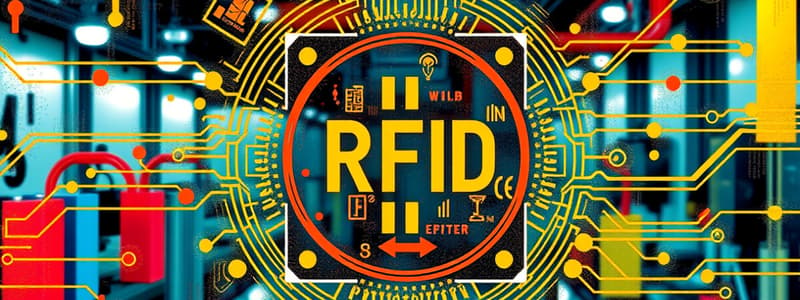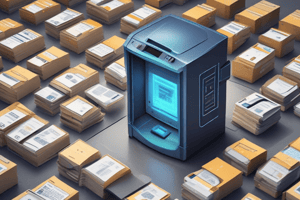Podcast
Questions and Answers
What is one of the key benefits of using RFID tags in retail inventory management?
What is one of the key benefits of using RFID tags in retail inventory management?
- Reduction of physical store space needed
- Elimination of the need for employees
- Increased accuracy of inventory tracking (correct)
- Minimizing supply chain disruptions
Which of the following is a major benefit of blockchain technology for data integrity?
Which of the following is a major benefit of blockchain technology for data integrity?
- Immutability of records (correct)
- Reduced verification steps
- Centralization of data management
- Increased storage capacity
What is a significant challenge associated with the adoption of GMOs in food production?
What is a significant challenge associated with the adoption of GMOs in food production?
- Increased crop yields
- Higher production costs
- Public perception and consumer acceptance (correct)
- Development of pest resistance
How does 5G technology specifically enhance global communication?
How does 5G technology specifically enhance global communication?
What is a primary environmental benefit of vertical farming and hydroponics?
What is a primary environmental benefit of vertical farming and hydroponics?
What significant role does IoT play in modern industry technology?
What significant role does IoT play in modern industry technology?
Which potential risk is associated with the use of autonomous vehicles in transportation?
Which potential risk is associated with the use of autonomous vehicles in transportation?
How do smart traffic management systems contribute to urban mobility?
How do smart traffic management systems contribute to urban mobility?
What is one of the main environmental benefits offered by vertical farming and hydroponics?
What is one of the main environmental benefits offered by vertical farming and hydroponics?
In what way does social media influence global business strategies?
In what way does social media influence global business strategies?
Flashcards are hidden until you start studying
Study Notes
RFID Tags and Inventory Management
- RFID tags automate the tracking of inventory, allowing for real-time visibility of stock levels.
- Reduces human error, enhancing accuracy in stock counts and minimizing losses.
- Streamlines the supply chain process by providing data on item movement, which improves restocking efficiency.
Blockchain Technology and Data Integrity
- Blockchain enhances transparency by enabling secure and immutable records, minimizing the risk of data tampering.
- Provides a decentralized ledger that eliminates third-party intermediaries, reducing costs associated with data handling.
- Smart contracts within blockchain facilitate trustworthy transactions and automate enforcement of agreements.
IoT in Modern Industry Technology
- IoT connects devices and systems, allowing for smart automation and enhanced data analytics in industries.
- Facilitates predictive maintenance by providing real-time data on equipment condition, reducing downtime and repair costs.
- Advances supply chain efficiency through improved logistics and inventory management via connected devices.
Social Media Platforms and Global Communication
- Social media enhances instant communication worldwide, breaking geographical barriers for individuals and businesses.
- Influences marketing strategies through targeted advertising and trend analysis, allowing brands to engage with specific demographics.
- Provides businesses a platform for customer feedback, enhancing customer service and brand loyalty.
Risks of Autonomous Vehicles
- Potential for software malfunctions or hacking, leading to critical failures and accidents.
- Ethical concerns arise over decision-making algorithms in critical situations (e.g., accident scenarios).
- Job displacement risks for transport professionals as autonomous technology becomes mainstream.
Impact of 5G Technology on Global Communication
- 5G offers significantly faster data transfer speeds, improving connectivity and user experiences on mobile devices.
- Supports a greater number of connected devices, enabling more efficient IoT ecosystems.
- Enhances capabilities for remote working and learning through improved video conferencing and collaboration tools.
Automation and Robotics in Manufacturing
- Automation increases efficiency and precision, leading to higher production rates with lower labor costs.
- Robotics handle repetitive and hazardous tasks, enhancing worker safety and reducing labor injuries.
- Promotes innovation and flexibility in manufacturing processes, allowing for rapid adaptation to changing market demands.
Challenges of GMOs in Food Production
- Concerns over potential allergic reactions and long-term health effects among consumers.
- Environmental risks include cross-contamination with non-GMO crops and loss of biodiversity.
- Ethical debates regarding the control of food production by large agribusinesses versus small farmers.
Smart Traffic Management Systems and Urban Mobility
- Utilize real-time data to reduce congestion through optimal traffic flow management and adaptive signal control.
- Improve emergency response times by prioritizing routes for emergency vehicles.
- Enhance public transportation efficiency by providing updated information for commuters.
Environmental Benefits of Vertical Farming and Hydroponics
- Reduces the carbon footprint by minimizing transportation needs due to local food production.
- Uses significantly less water compared to traditional farming methods, promoting sustainability.
- Allows for year-round crop production in controlled environments, reducing dependency on seasonal growing cycles.
RFID Tags and Inventory Management
- RFID tags automate the tracking of inventory, allowing for real-time visibility of stock levels.
- Reduces human error, enhancing accuracy in stock counts and minimizing losses.
- Streamlines the supply chain process by providing data on item movement, which improves restocking efficiency.
Blockchain Technology and Data Integrity
- Blockchain enhances transparency by enabling secure and immutable records, minimizing the risk of data tampering.
- Provides a decentralized ledger that eliminates third-party intermediaries, reducing costs associated with data handling.
- Smart contracts within blockchain facilitate trustworthy transactions and automate enforcement of agreements.
IoT in Modern Industry Technology
- IoT connects devices and systems, allowing for smart automation and enhanced data analytics in industries.
- Facilitates predictive maintenance by providing real-time data on equipment condition, reducing downtime and repair costs.
- Advances supply chain efficiency through improved logistics and inventory management via connected devices.
Social Media Platforms and Global Communication
- Social media enhances instant communication worldwide, breaking geographical barriers for individuals and businesses.
- Influences marketing strategies through targeted advertising and trend analysis, allowing brands to engage with specific demographics.
- Provides businesses a platform for customer feedback, enhancing customer service and brand loyalty.
Risks of Autonomous Vehicles
- Potential for software malfunctions or hacking, leading to critical failures and accidents.
- Ethical concerns arise over decision-making algorithms in critical situations (e.g., accident scenarios).
- Job displacement risks for transport professionals as autonomous technology becomes mainstream.
Impact of 5G Technology on Global Communication
- 5G offers significantly faster data transfer speeds, improving connectivity and user experiences on mobile devices.
- Supports a greater number of connected devices, enabling more efficient IoT ecosystems.
- Enhances capabilities for remote working and learning through improved video conferencing and collaboration tools.
Automation and Robotics in Manufacturing
- Automation increases efficiency and precision, leading to higher production rates with lower labor costs.
- Robotics handle repetitive and hazardous tasks, enhancing worker safety and reducing labor injuries.
- Promotes innovation and flexibility in manufacturing processes, allowing for rapid adaptation to changing market demands.
Challenges of GMOs in Food Production
- Concerns over potential allergic reactions and long-term health effects among consumers.
- Environmental risks include cross-contamination with non-GMO crops and loss of biodiversity.
- Ethical debates regarding the control of food production by large agribusinesses versus small farmers.
Smart Traffic Management Systems and Urban Mobility
- Utilize real-time data to reduce congestion through optimal traffic flow management and adaptive signal control.
- Improve emergency response times by prioritizing routes for emergency vehicles.
- Enhance public transportation efficiency by providing updated information for commuters.
Environmental Benefits of Vertical Farming and Hydroponics
- Reduces the carbon footprint by minimizing transportation needs due to local food production.
- Uses significantly less water compared to traditional farming methods, promoting sustainability.
- Allows for year-round crop production in controlled environments, reducing dependency on seasonal growing cycles.
Studying That Suits You
Use AI to generate personalized quizzes and flashcards to suit your learning preferences.




